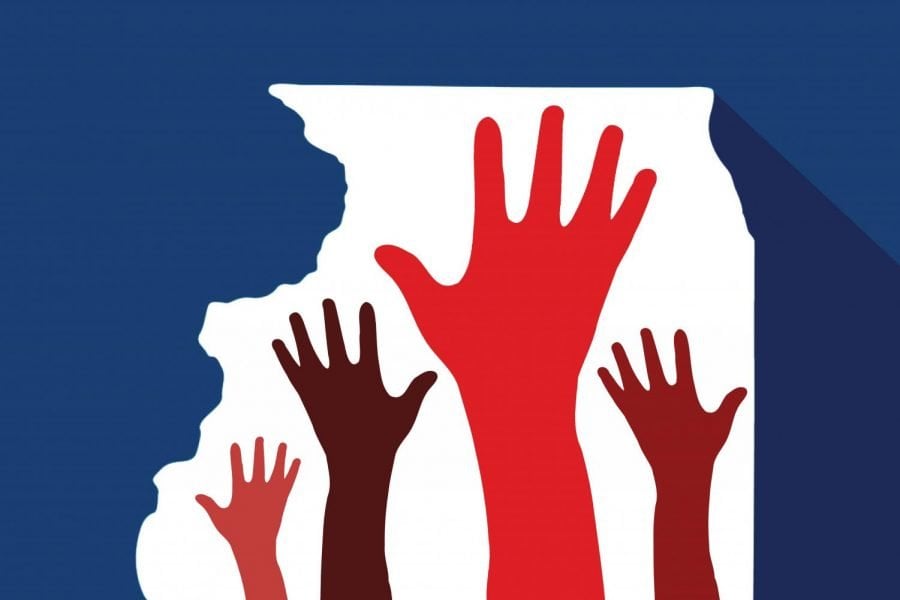Community leaders discuss local methods to combat voter suppression in NAACP virtual forum
Illustration by Catherine Buchaniec
The proposed legislation would prevent “right-to-work” laws in Illinois.
May 5, 2021
State officials and community leaders discussed ways to mobilize Black and brown communities against Republican efforts to restrict ballot access in a Evanston/North Shore NAACP forum Tuesday.
“Our nation is facing the most coordinated deliberate effort to suppress voters of color since the days of Jim Crow,” U.S. Sen. Dick Durbin said at the virtual forum. After Donald Trump made claims around voter fraud following the 2020 election, Republican legislators in more than 40 states have introduced bills that would restrict voting access.
Durbin began the forum by discussing two House bills that would expand voting rights — the John Lewis Votings Rights Act and the newly proposed For The People Act.
While he acknowledged the bills would be unlikely to pass the Senate because of the filibuster — which is when one or more senators delay the vote by extending deliberation — Durbin said the acts are starting an important conversation for the future of voting rights in the United States.
Evanston/Northshore NAACP president Michael Nabors said getting the House bills passed will be a challenge, but “the challenge is historical.”
Nabors described how the United States government stripped Black men of the right to vote in 1874. Federal and state governments continued employing laws and regulations to suppress Black voters until the Voting Rights Act of 1965 outlawed discriminatory voting practices.
“Now, as you all know, people are hard pressed to take that right away, again,” Nabors said, “because they know how powerful it is for Black and brown people.”
State Sen. Laura Fine (D-Glenview) said Illinois has recently passed legislation to make it easier to vote in the state.
For example, the state recently expanded the period during which people can send mail-in ballots, and now allows 17-year-olds to vote in primary elections if they will turn 18 by the general election.
“In Illinois, our voting rights are secure,” Fine said.
In Evanston, however, voter turnout in the recent 2021 municipal elections decreased compared to four years ago. Around 25 percent of the city’s registered voters cast a ballot this year, down from the 37 percent of registered voters who voted in 2017.
The 5th Ward had the lowest voter participation rate this election.
Bennett Johnson, a 91-year-old Evanston resident, said the historically low turnout of Black voters has always been a “mystery” to him.
Johnson, who has been politically active all his life and worked with Martin Luther King, Jr. in the 1950s and 60s, said it’s important to look at history when discussing steps forward because a lot has already been accomplished.
“If we realize that we’ve been there before, we’ve done it before, we feel more self esteem and more of an urge to do better and to stay the course and to keep the faith high,” Johnson said.
Nabors said it’s important for voters in Evanston to create a “unified front” to encourage voting rights citywide. He advocated for the foundation of an Evanston chapter of Fair Fight Action, a nationwide organization fighting voter suppression, which Stacey Abrams began in Georgia.
The Evanston/North Shore NAACP and Indivisible Evanston will also host a voting rights votercade this Saturday outside the Lorraine Morton Civic Center to demand passage of the For The People Act and the John Lewis Voting Rights Act.
Johnson stressed that the power ultimately lies in the ballot.
“This is the one thing that we are equal with,” Johnson said. “Every person in the United States — including the president — has only one vote. And we have to use it.”
Email: [email protected]
Twitter: @yimingfuu
Related Stories:
— Evanston municipal elections draw one-fourth of eligible voters
— As election results finalize, City Council could see up to four new aldermen
— “Rigged: The Voter Suppression Playbook” discusses voter disenfranchisement


